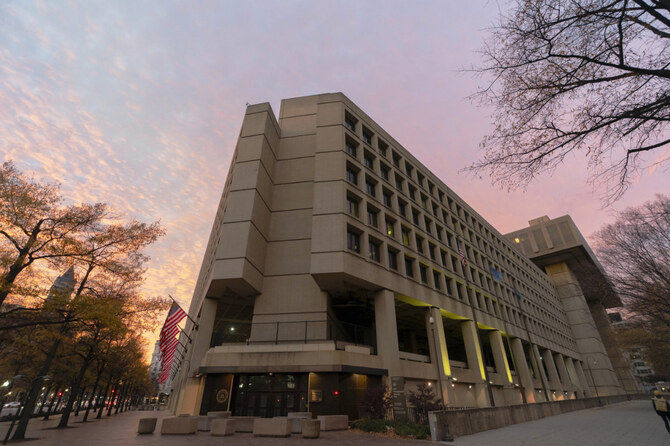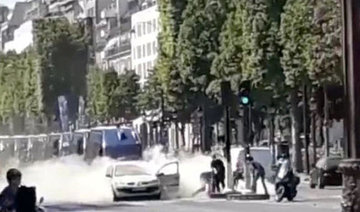WASHINGTON: President Donald Trump’s administration launched a sweeping round of cuts at the Justice Department on Friday that appeared to focus on FBI agents and others who worked on cases related to the Jan. 6, 2021, attack by his supporters on the US Capitol.
The shakeup, detailed in two memos seen by Reuters and by three sources familiar with the matter, is the Trump administration’s latest move to remake the US criminal justice system since he returned to the presidency last week. A group representing FBI agents issued a rare public warning of the potential for hundreds of firings at the nation’s top law enforcement agency.
The new administration already has fired more than a dozen prosecutors who pursued criminal charges against Trump in two cases brought by Special Counsel Jack Smith that have been dismissed. It also has paused all civil rights and environmental litigation and ordered criminal investigations of state and local officials who interfere with his hard-line immigration initiatives.
Acting Deputy Attorney General Emil Bove on Thursday told the top federal prosecutors in each state to compile a list of all prosecutors and FBI agents who worked on the investigation of the Capitol riot, which was the largest Justice Department probe in modern US history, two sources briefed on the matter said.
The sources spoke on condition of anonymity.
The FBI was ordered to provide by Tuesday a list of all employees who worked on a 2024 criminal case brought by the Justice Department against leaders of the Hamas militant group, according to a memo seen by Reuters. A source briefed on the matter also said the FBI was asked to provide a list of employees who worked on the two Trump cases brought by Smith.
That memo ordered eight FBI officials to resign or be fired, saying that their participation in the Jan. 6 cases represented part of what Trump has called the “weaponization” of government.
In a statement on Friday, the FBI Agents Association, a membership group of more than 14,000 active and former FBI agents, called the moves “outrageous.”
“Dismissing potentially hundreds of agents would severely weaken the bureau’s ability to protect the country from national security and criminal threats and will ultimately risk setting up the bureau and its new leadership for failure,” the association added.
The staff cuts are hitting career FBI officials and prosecutors in nonpartisan roles who typically remain in their posts from administration to administration. The bureau has a history of political independence and is responsible for highly sensitive investigations involving counterterrorism, public corruption and cybersecurity.
In his first day back in the White House on Jan. 20, Trump granted clemency to all of the nearly 1,600 people charged with storming the Capitol in a failed bid to block Congress from certifying the results of the 2020 election won by Democrat Joe Biden.
Ed Martin, the Trump-appointed top federal prosecutor in Washington, has since launched an inquiry into the use of a felony obstruction charge in prosecutions of people accused of taking part in the Jan. 6 attack.
Major cities targetted
At least five top FBI officials in major US cities — Miami, Philadelphia, Washington, New Orleans and Las Vegas — were ordered to resign or be fired, one of the sources said. Another source said that a sixth senior FBI official, in Los Angeles, was given a similar order.
Another five top officials in FBI headquarters were ordered to leave or face termination earlier in the week, another source told Reuters.
FBI and Justice Department officials declined to comment on the various moves.
“What we are seeing is a raw, unfiltered exercise of presidential authority to purge the government of anyone who put the Constitution first, instead of adherence or loyalty to Donald Trump,” said Bradley Moss, an attorney who represents federal employees.
“At a time when we are facing a multitude of threats to the homeland ... it is deeply alarming that the Trump administration appears to be purging dozens of the most experienced agents who are our nation’s first line of defense,” Democratic US Senator Mark Warner said in a statement. Kash Patel, Trump’s nominee to lead the FBI, told a US Senate panel on Thursday during his confirmation hearing that he would protect the bureau’s 37,000 employees against “political retribution” if he were confirmed. The same day, the Justice Department said it was investigating the release by an upstate New York sheriff’s office of an immigrant living in the US illegally. This appears to be its first use of a new policy to criminally investigate state and local officials who do not comply with Trump’s directives.
Bove, in a separate Friday memo seen by Reuters, ordered the firings of all prosecutors who had been hired on a probationary basis to work on Jan. 6-related cases, noting that Trump characterized their work as “a grave national injustice.”
About 20 people were fired as a result of that order, according to a source familiar with the move.
Bove also accused the Biden administration of rushing to convert the status of probationary prosecutors to permanent status after Trump won the election in a bid to save their jobs.




























